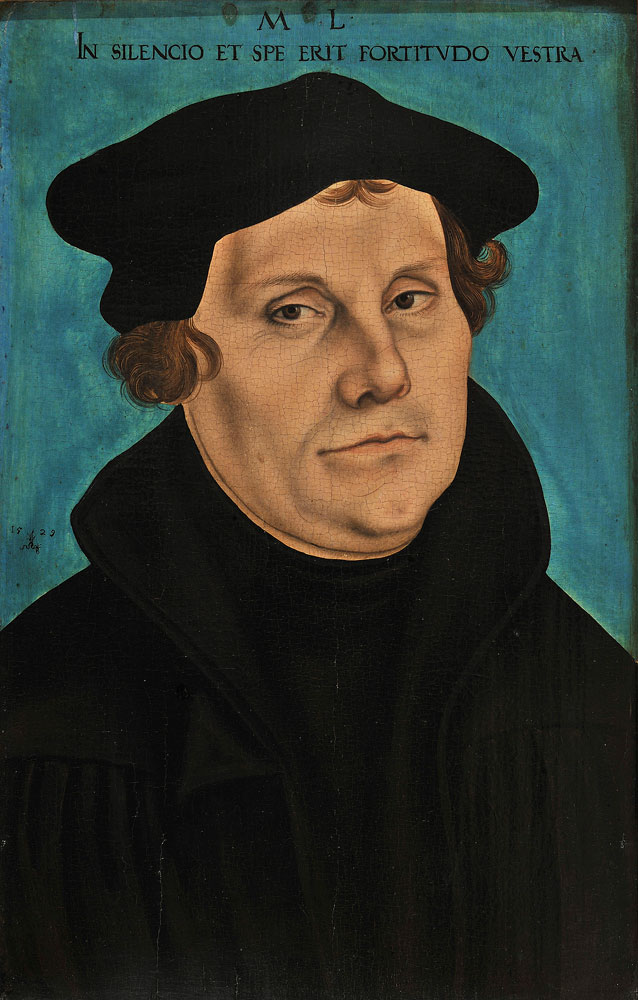
Martin Luther was born on November 10, 1483, in Eisleben, at that time in the county of Mansfeld in the Holy Roman Empire. Germany was a cluster of small kingdoms all ruled overall by one Austrian Archduke, and the Papacy ran supreme in Europe.
He was educated in several schools early in his life. He was taught grammar, rhetoric and logic, which he loathed. Luther attended the University of Erfurt starting 1501, when he was 17, and received a master’s degree there four years later.
Throughout his life he believed in loving God and finding God throughout faith alone. He was afraid of divine judgement, and became a monk at St. Augustine’s Monastery in 1505. He found fasting, long hours of prayer, and pilgrimage miserable, and began to lost love for God. So a few years later he was moved to teach at the University of Wittenberg. He was wildly successful there, and in 1512 he became part of the senate of the theological faculty.
Martin Luther was given power and influence within the Church, but he was staunchly against the indulgences the Papacy had been selling to the public. The Catholic Church told the common people that if they gave the Church some of their money and possessions, and often it was many of their possessions, they would be granted a place in Heaven.
The Catholic Church then used all their acquired wealth for personal use, build for themselves lavish Cathedrals, and grow even more powerful than they already were. For example, a Dominican Frier Johann Tetzel was sent to Germany by the Church to sell to the common people indulgences. Why? They wanted money to rebuild St. Peter’s Basilica back in Rome. Martin Luther, though educated through the Church, began to speak out against it.
He famously wrote the 95 Theses, condemning the corrupt practice of indulgences. On October 31, 1517, he sent it to his Bishop, Albrecht c=von Brandenberg. Legend has it that he nailed it on the door of All Saint’s Church in Wittenberg, for all to see. We are still unclear if it did happen, or not. It was copied and distributed throughout Germany, written in Latin, during the following months. In January of the next year, some of Luther’s friends decided to translate the 95 Theses into German, so that literate Germans could read the Theses for themselves.
Within two weeks, the German translation encompassed all of Germany, and even made its way to France, England, and Italy by 1519. Many people, including authorities, were appalled by Papal corruption. The power of the Church was under greater threat than ever before.
On May 25, 1521, after the Edict of Worms, Martin Luther was arrested by the Catholic Church, and made it a crime for anyone to provide Martin Luther food or shelter. But, Frederick the Wise of Saxony was the man who rescued Martin Luther; Disguised as a highway robber, he took Martin Luther and brought him to Wartburg Castle at Eisenach.
At Wartburg, Martin Luther translated the New Testament of the Bible from Greek into German. Within a few years of its publication, this shook Europe. The common citizens were able to hear the gospel for themselves, thousands then eventually millions rebelled against Papal corruption, as well as some princes throughout the Holy Roman Empire.
Martin Luther secretly returned to Wittenberg on March 6, 1522. The support which he had gained from the common populace throughout Germany was immense. He was now the focus of opposition to the Roman Catholic Church, and its rampant corruption. It came to a climax during the German Peasants’ War from 1524 to 1525. They were slaughtered by the highly-armed nobles. Martin Luther had to alter his position, and condemned the violence of the peasantry.
Despite this, Luther’s influence remained, and the effect he had on Europe was permanent; It was forever changed, and would remain heavily divided for the next 130 years. Martin Luther, during the late 1520s helped set up the Lutheran Church. The Reformation had the greatest effect on England and Scandinavia, where protestantism rapidly and drastically took hold of both places in its entirety. It led to Calvinism in Switzerland, and Henry VIII establishing the Church of England.
During the 1530s, Martin Luther’s health began to deteriorate. He suffered from a multitude of illnesses, including kidney and bladder stones. He had been in poor shape earlier, suffering from Méniére’s disease, vertigo, fainting, tinnitus, and impaired sight in one eye. During his last years, he became deaf in one ear, and developed horrible chest pain.
His final sermon was on February 15, 1546, and he died only three days later at 2:45 am on the 18th. Less than two hours earlier, his companions Justus Jonas and Michael Coelius shouted to him, who lay in his bed, “Reverend father, are you ready to die trusting in your Lord Jesus Christ and to confess the doctrine in which you taught in his name?” Luther replied with a definite “Yes.” Soon after, a stroke took away his speech.
Martin Luther stood confidently in the face of the Catholic Church, which had domineered over Europe for a thousand years. He was hated, and demonized, and was threatened death, but he persevered and as a result people were able to read the Holy Book on their own, bringing to people greater knowledge in the Gospel, greater literacy, greater freedom, and greater prosperity for Europe long-term. Although his anti-semitism was a very malicious quality of his we condemn, the grace and confidence Luther showed, standing alone in the face of authority and judgement is certainly something we all can learn from, and practice.
